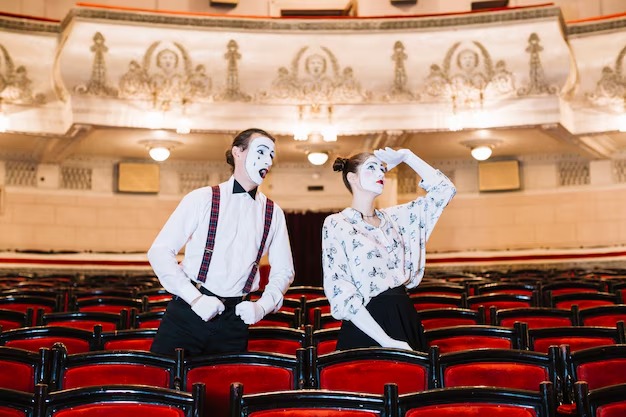
23 December 2024
Exploring the Depths of Benjamin Britten the Turn of the Screw Operas

For aficionados of dramatic expression and soulful melodies, immersing oneself in tales woven through the artistry of theater stands as an unforgettable experience. This journey into the realm of stagecraft brings to light extraordinary stories that captivate audiences, resonating with the heart and soul of a vibrant metropolis. Each performance combines intricate storytelling with mesmerizing compositions, creating a unique atmosphere that enchants spectators.
With a rich tapestry of settings and themes, these performances offer glimpses into the human condition, echoing emotions and experiences that transcend time and geography. From grand palaces to quaint venues, the experiences unfold in spaces alive with history, providing a backdrop that enhances the artistry presented. Each event serves not only as entertainment but as a celebration of creativity and passion.
Join in exploring remarkable narratives that highlight the intricate relationship between location and artistry. Whether seeking timeless classics or innovative interpretations, the charm of these captivating shows invites all to partake in an exhilarating cultural experience, leaving an indelible mark on those who attend.
In the realm of classical music and theatrical performances, certain productions stand out as essential experiences. These masterpieces not only showcase extraordinary talent but also offer a glimpse into the rich tapestry of historical and cultural narratives. Attending these productions allows one to immerse themselves in vibrant storytelling through mesmerizing melodies and powerful performances.
One exemplary work that captivates audiences is Benjamin Britten’s “Peter Grimes”. Set against the backdrop of a coastal village, this opera explores themes of isolation and societal judgment, beautifully illustrated through haunting music and compelling character arcs.
Another remarkable piece is Giacomo Puccini’s “La bohème”, which paints a poignant picture of love and heartbreak among young artists in a vibrant urban setting. Its lush score and relatable characters have made it a timeless favorite among opera lovers.
Lastly, Henry Purcell’s “Dido and Aeneas” offers a baroque journey through love and loss, featuring stunning arias and a dramatic narrative that resonates deeply with audiences, showcasing the poignant beauty of English operatic tradition.
Each of these productions provides a unique opportunity to experience the power of live performance, making them essential for anyone seeking an enriching and unforgettable evening in the world of classical music.
Opera holds a prominent position within the vibrant tapestry of artistic expression found in this bustling metropolis. It serves as both a reflection of society’s values and a conduit for profound emotional experience. Throughout history, this musical form has managed to captivate audiences, fostering a deeper appreciation for the performing arts and connecting communities through shared experiences.
From grand productions to intimate performances, operatic works have provided a platform for exploring complex themes and social issues. The rich history of this art form here has influenced not only local traditions but also international trends within the genre, making it a significant cultural touchstone.
| Period | Influence | Notable Works |
|---|---|---|
| 17th Century | Establishment of opera houses | Henry Purcell’s “Dido and Aeneas” |
| 19th Century | Growth of Romantic operas | Giuseppe Verdi’s “Rigoletto” |
| 20th Century | Modern adaptations and themes | Britten’s “Peter Grimes” |
Through these powerful narratives and stunning musical compositions, opera continues to enrich the cultural landscape, inviting both contemplation and enjoyment. It is a vital part of this city’s identity, fostering dialogue and interaction among audiences from diverse backgrounds while celebrating its historical roots.
Exploring beloved locations where enchanting melodies and dramatic narratives come alive creates unforgettable experiences for fans of this timeless art form. These iconic places offer not only stunning performances but also rich histories, impressive architectures, and vibrant atmospheres that elevate every visit.
Royal Opera House, situated in Covent Garden, serves as a premier destination for aficionados. Home to both opera and ballet, this majestic venue boasts a unique blend of tradition and innovation. Visitors can immerse themselves in spectacular productions while enjoying its stunning interiors and exceptional acoustics.
Another remarkable place is the English National Opera, located at the London Coliseum. Renowned for its commitment to accessibility and diverse repertoire, this establishment attracts diverse audiences. Each performance showcases world-class talent and celebrates a rich array of operatic styles, appealing to both seasoned attendees and newcomers alike.
Throughout history, numerous influential composers have drawn inspiration from this vibrant city, shaping their music and leaving a lasting impact on the world of performing arts. These musical maestros found in the streets, culture, and essence of the metropolis a wellspring of creativity that fueled their compositions. The relationship between these artists and the city highlights a unique blend of local traditions and universal themes.
Benjamin Britten stands out as one of the most notable figures in British music, with many works showcasing his profound connection to the urban landscape and its people. His operas often reflect the social fabric of society, emphasizing human emotions and relationships.
Henry Purcell, another eminent composer, made his mark in the 17th century, capturing the spirit of his times through rich melodies and compelling narratives. His contributions to music not only illustrate his genius but also mirror the dynamic cultural scene of that era.
Giuseppe Verdi, while primarily associated with Italy, had a significant impact on the musical life of the city, performing and inspiring local musicians. His works transcended national boundaries, resonating deeply with audiences and leaving a profound legacy.
These luminaries, among others, carved their names into the annals of musical history, inspired by a city that pulsates with artistic energy. Their legacies continue to inspire modern composers and musicians across the globe.
Capital’s operatic works are characterized by a rich tapestry of tradition and innovation. These compositions reflect a distinctive blend of historical significance and contemporary creativity, encapsulating diverse narratives that resonate deeply with audiences. The vibrant cultural landscape serves as a backdrop, enhancing the emotional depth and thematic complexity presented on stage.
Timeless stories are interwoven with local landmarks and events, offering an immersive experience that transcends time. Whether inspired by regal events or everyday life, these performances often draw on iconic figures and locales, making them relatable yet grand. The historical context breathes life into operatic themes, allowing spectators to engage with familiar settings that evoke a sense of place.
Composition styles in this arena often showcase a fusion of genres, pushing boundaries and challenging conventions. Contemporary works frequently incorporate elements from various musical traditions, creating a unique soundscape that captivates both seasoned and new audiences. This innovative approach not only honors classical roots but also embraces modern influences, establishing a dynamic art form that evolves with time.
This year promises an exciting lineup of performances that will captivate audiences and showcase incredible talent. Each presentation brings unique stories and innovative interpretations, making them must-see events for those passionate about the art form.
Mark your calendars and prepare to indulge in the rich narratives and thrilling performances that await in the coming months!
Handel’s “Messiah” is significant because it is one of the most performed choral works in Western music. Composed in 1741, it has become a staple of the Christmas season, celebrated for its powerful music and profound texts, which reflect themes of hope and redemption.
Handel’s early life in Halle, Germany, played a crucial role in shaping his musical career. He was exposed to various musical styles and traditions, including opera and church music, which influenced his later compositions and helped him develop a unique style that blended different genres.
Key features of Handel’s compositional style include the use of bold melodies, dramatic contrasts, and rich orchestration. He often incorporated elements from Italian opera and German choral traditions, creating a distinctive sound that remains influential today.
Some of Handel’s most important operas include “Giulio Cesare,” “Rinaldo,” and “Alcina.” These works showcase his ability to blend dramatic storytelling with beautiful music, solidifying his reputation as one of the leading composers of the Baroque period.
Handel contributed to the development of oratorio by expanding its scope and popularity. His works, particularly “Messiah,” elevated the oratorio to new heights, incorporating dramatic elements and engaging narratives that appealed to both religious and secular audiences.
Patronage played a significant role in Handel’s success, as he received support from various aristocrats and royal figures throughout his career. This financial backing allowed him to compose freely and produce large-scale works that might not have been possible otherwise.
Handel’s music reflected the cultural context of his time by incorporating diverse influences from different countries, such as Italy and England. His ability to blend these styles resonated with audiences and mirrored the cosmopolitan nature of 18th-century Europe.
The historical significance of Handel’s “Water Music” lies in its association with King George I, who commissioned it for a royal boat trip on the Thames River. This work marked a turning point in public concerts and outdoor performances, showcasing Handel’s ability to write music for both intimate and grand occasions.
Handel’s music evolved throughout his career as he transitioned from composing operas to focusing more on oratorios and instrumental works. This shift was influenced by changing tastes in music and audience preferences, leading him to explore new forms and styles.
Handel had a profound impact on future generations of composers through his innovative approach to melody, harmony, and orchestration. His works inspired composers such as Mozart and Beethoven, who admired his ability to convey emotion and drama through music.
Some notable operas set in England include “Gloriana” by Benjamin Britten, “The Rake’s Progress” by Stravinsky, and Handel’s operas. These works reflect the cultural context of their time by incorporating English history, social issues, and national identity.
Italian opera had a significant impact on the development of opera in England, particularly during the 18th century. The popularity of Italian operas led to the establishment of opera companies that performed these works, influencing English composers to adopt similar styles and conventions.
The top 10 operas set in England include “Gloriana,” “Peter Grimes,” “The Rake’s Progress,” “A Midsummer Night’s Dream,” “The Turn of the Screw,” “The Marriage of Figaro,” “Carmen,” “The Mikado,” “Billy Budd,” and “The Magic Flute.” These operas have gained recognition for their compelling stories and musical innovation.
Handel’s London operas played a crucial role in popularizing the genre during the early 18th century. His ability to blend Italian opera with English themes attracted diverse audiences, establishing a foundation for future opera seasons in London.
The King’s Theatre, located in Haymarket, was significant as it became a primary venue for Italian opera performances in London. It hosted many of Handel’s operas and was a hub for opera companies, shaping the landscape of musical theatre in the city.
The emergence of new opera styles, such as romantic and grand operas, influenced traditional forms like comic opera by introducing more complex characters and narratives. This evolution allowed comic operas to incorporate deeper themes while retaining their humor and lightheartedness.
Some of the best operas featuring pasticcio elements include “Il Barbiere di Siviglia” by Rossini and Handel’s own pasticcio operas. These works utilize pre-existing arias from various composers, creating unique musical experiences that blend different styles.
Handel wrote his famous operas during his time back in London by drawing inspiration from both Italian opera traditions and English storytelling. His innovative approach to composition allowed him to create memorable melodies and engaging librettos that resonated with audiences.
Giovanni Bononcini played a significant role in the competition among opera composers in London during the early 18th century. His rivalry with Handel showcased contrasting styles within Italian opera, influencing public taste and leading to innovative developments in the genre.
Vaughan Williams and other composers contributed to the evolution of English opera by infusing their works with nationalistic themes and folk elements. Their compositions, including “Hugh the Drover” and “Sir John in Love,” helped establish a distinct English voice within the broader context of opera.
Leave a comment